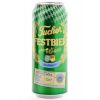Tucher Bräu - Festbier
-
ABV:
5.8% -
Bottle Size:
500-ml -
Serving Temperature:
42-47° F -
Suggested Glassware:
Willi Becher, Mug, Stein, Pint Glass
Traditionally brewed in March (März), Märzen, the original Oktoberfest beer style, was brewed with more malt than usual (which yields more fermentable sugars, which in turn yields more alcohol) in order to beef the beer up to survive storage through the summer months when it was generally too hot to brew. Since the 1990s, the beer commonly served at Oktoberfest has been the somewhat lighter style known as Festbier. Tucher’s version presents a bright golden hue with excellent clarity, topped by a robust head of tight-bubbled white foam. On the nose, prominent pale malts offer some doughy bread and light toast character, along with a hay-like impression. Riding above, look for the traditional noble hops to deliver dried herbal notes and some grassiness. We picked up flashes of apple skins and citrus zest, as well. On the palate, that malty core really comes through nicely with robust cereal grains, impressions of graham cracker, and freshly broken bread. A note of sweetness is countered by moderate hop bitterness and the spicy-herbal noble hop character we love in beers of this region of the world. Satisfying and drinkable, it’s easy to see why this style has become the preferred beer of modern German festival-goers. For pairing options, we’d steer towards roasted fowl like turkey or chicken, strong cheeses, grilled brats or knockwurst with sauerkraut, or a warm soft pretzel with coarsely ground sweet mustard. Prost!
Germany's Franconia region, which lies primarily in Bavaria, has a well known winemaking history, but the region around Nuremberg has dry soil not suitable to the growing of grapes. Consequently, the German vintner's industry never really gained solid footing there. Wheat-growing fields, on the other hand, have traditionally been abundant, as has a local thirst for sustaining, liquid refreshment. Thus was born a great tradition of regional wheat beer brewing. In fact, the region is home to one of Germany's oldest and most prolific brewing heritages.
You may already be familiar with the fundamental Bavarian beer purity law known as the Reinheitsgebot of 1516, which mandates that all beer be made with only water, malt, hops and yeast. It's an edict that has guided not only German brewers, but also many of the craft brewers in the American microbrew revolution. Fascinatingly, Nuremberg had its own pure-beer law established in 1303, more than 200 years before Bavaria's more well-known Reinheitsgebot!
Tucher Bräu (Tucher is pronounced “took’er”) was founded in Nuremberg three and a half centuries ago. It began as an integral member of the wheat beer brewing force in 1672 and for part of its history was owned by Bavaria's royal family. An ancient patrician family who settled in Nuremberg in the 11th century, the Tucher family (or “Freiherrlich von Tucher'schen Familie” for you German purists out there) took over in 1855. Though the brewery has had several owners in the many years since, the Tucher family name has been preserved. The Tucher Bräu brewery actually straddles the border between the cities of Nuremberg and Fürth, and they celebrate their odd “2-Städte-Sudhaus” (2-city brewhouse) by marking the border line throughout the brewhouse.
The brewery produces several different beers including kellerbier, pilsner, and traditional hefeweizen wheat beer, as well as their Festbier which we’re proud to bring you this month. We hope you enjoy this Franconian brew as much as we did!

Unmatched Variety by style, brewery & country
Choose from Five different Beer Clubs offering unmatched variety by brewery,
country of origin, and beer style to suit your specific tastes.


